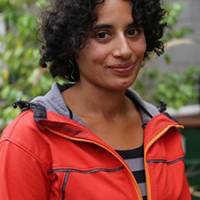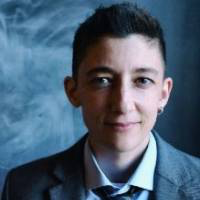Philadelphia, PA
February 3-5, 2017
Participants

Danielle Bassett
Danielle S. Bassett is the Eduardo D. Glandt Faculty Fellow and Associate Professor in the Department of Bioengineering at the University of Pennsylvania. She is most well-known for her work blending neural and systems engineering to identify fundamental mechanisms of cognition and disease in human brain networks. She received a B.S. in physics from the Pennsylvania State University and a Ph.D. in physics from the University of Cambridge, UK. Following a postdoctoral position at UC Santa Barbara, she was a Junior Research Fellow at the Sage Center for the Study of the Mind. In 2012, she was named American Psychological Association’s `Rising Star’ and given an Alumni Achievement Award from the Schreyer Honors College at Pennsylvania State University for extraordinary achievement under the age of 35. In 2014, she was named an Alfred P. Sloan Research Fellow and received the MacArthur Fellow Genius Grant. In 2015, she received the IEEE EMBS Early Academic Achievement Award, and was named an ONR Young Investigator. In 2016, she received an NSF CAREER award and was named one of Popular Science’s Brilliant 10. She is the founding director of the Penn Network Visualization Program, a combined undergraduate art internship and K-12 outreach program bridging network science and the visual arts. Her work — which has resulted in 105 published articles — has been supported by the National Science Foundation, the National Institutes of Health, the Army Research Office, the Army Research Laboratory, the Alfred P Sloan Foundation, the John D. and Catherine T. MacArthur Foundation, and the Office of Naval Research.

Robert Ghrist
Robert Ghrist (Ph.D., Cornell, Applied Mathematics, 1995) is the Andrea Mitchell PIK Professor of Mathematics and Electrical & Systems Engineering at the University of Pennsylvania. He is a recognized leader in the field of Applied Algebraic Topology, with publications detailing topological methods for sensor networks, robotics, signal processing, tracking, network discovery, and more. He is the author of a leading textbook on the subject (Elementary Applied Topology, 2014). His prior work in leading the DARPA DSO SToMP project and participating in several DoD MURIs is complemented by NSF CAREER, NSF PECASE, SciAm50, and Vannevar Bush Faculty Fellow awards.
Ghrist is also a dedicated expositor and communicator of Mathematics, with teaching awards that include the MAA James Crawford Prize, Penn’s Lindback Award, and the S. Reid Warren award in Engineering at Penn. Ghrist is the author and animator of a popular MOOC on Calculus at Coursera, featured in the New York Times, BoingBoing, and Gizmodo. His current project is the “Calculus BLUE” series of electronic comic books on multivariable calculus.

Elizabeth Hyde
Elizabeth Hyde is the Research Coordinator for the Imagination Institute and a 2014 graduate of the University of Pennsylvania. Also referred to as the Institute’s “Chief Curiosity Rover,” Elizabeth loves learning about openness to experience and creativity through the lens of positive psychology.

Kristy Johnson
Kristy Johnson is a Ph.D. student and Learning Innovation Fellow in the Affective Computing group at the MIT Media Lab. Prior to joining MIT, Kristy earned her B.S. and M.S. in physics, doing research on superfluid helium. After her son was born with an extremely rare genetic disorder, involving global developmental delays and autism, her career abruptly shifted to neurodevelopmental disorders. She now builds responsive, customizable systems to study and assist individuals with complex developmental needs.

Martin Seligman
Martin Seligman is the Director of the Positive Psychology Center at the University of Pennsylvania and Executive Director of the Imagination Institute. Commonly known as the founder of Positive Psychology, he is a leading authority in the fields of Positive Psychology, resilience, learned helplessness, depression, optimism, and pessimism. He is also a recognized authority on interventions that prevent depression, and build strengths and well-being. He has written more than 250 scholarly publications and 20 books. Dr. Seligman’s books have been translated into more than twenty languages and have been best sellers both in America and abroad. Among his better-known works are Flourish, Authentic Happiness, Learned Optimism, The Optimistic Child, Helplessness, and Abnormal Psychology. His book Character Strengths and Virtues: A Handbook and Classification, was co-authored with Christopher Peterson.
In 1998, Dr. Seligman was elected President of the American Psychological Association. His primary aim as APA President was to join practice and science together so both might flourish – a goal that has dominated his own life as a psychologist. Since 2000, his main mission has been the promotion of the field of Positive Psychology. Dr. Seligman is expanding Positive Psychology to education, health, and neuroscience, and has applied his research to groups like teachers and students, the U.S. Army, athletes, and every-day people. His goal is to make the world happier.
Dr. Seligman was born in Albany, NY and received his B.A. from Princeton University, Summa Cum Laude (Philosophy), 1964; Ph.D. from the University of Pennsylvania (Psychology), 1967; Ph.D., Honoris causa, Uppsala University, Sweden, 1989; Doctor of Humane Letters, Honoris Causa, Massachusetts College of Professional Psychology, 1997; Ph.D., Honoris Causa, Complutense University, Spain, 2003; and Ph.D., Honoris Causa, University of East London, 2006.

Seeta Sistla
Seeta Sistla is an assistant professor of ecosystem ecology at Hampshire College. Dr. Sistla studies how soils, plants, and microbial communities respond to environmental change, and how these changes can feedback to affect larger-scale ecosystem processes. This research combines biogeochemistry, microbial ecology, mechanistic modeling, and field studies. Dr. Sistla’s work is based in a number of ecosystems, including Arctic tundra, temperate biomes, and the neotropics. Dr. Sistla am also interested in science education, integrating ecological research with art-making, and improving how scientific knowledge is used in decision-making and conservation efforts.

Steven Strogatz
Steven Strogatz studied at Princeton, Cambridge, and Harvard and taught at MIT before moving to Cornell in 1994. A renowned teacher and communicator, he has blogged about math for the New York Times and has been a frequent guest on RadioLab and Science Friday. His honors include a Marshall Scholarship; a Presidential Young Investigator Award; MIT’s highest teaching prize; a lifetime achievement award for the communication of mathematics to the general public; the Lewis Thomas Prize for Writing about Science; and membership in the American Academy of Arts and Sciences. He is the author of Nonlinear Dynamics and Chaos, Sync, and The Calculus of Friendship. His latest book, The Joy of x, has been translated into 15 languages.
Steven Strogatz is the Jacob Gould Schurman Professor of Applied Mathematics at Cornell University. He works in the areas of nonlinear dynamics and complex systems, often on topics inspired by the curiosities of everyday life. For example, he has explored the geometry of supercoiled DNA, the dynamics of the human sleep-wake cycle, the wobbling of London’s Millennium Bridge on its opening day, the topology of three-dimensional chemical waves, and the synchronization of fireflies and other biological oscillators. Perhaps his best-known research contribution is his 1998 Nature paper on “small-world” networks, co-authored with his former student Duncan Watts. It has now been cited more than 30,000 times, according to Google Scholar.

Perry Zurn
Perry Zurn is Assistant Professor of Philosophy at American University and Center for Curiosity Fellow at the University of Pennsylvania. His research specifically contributes to curiosity studies and the philosophy of punishment, and more broadly concerns research ethics and political philosophy. Dr. Zurn is currently writing a monograph-length study of curiosity as philosophical method and political practice, preliminarily entitled The Politics of Curiosity. He is the coauthor of Curious Minds (MIT Press, under contract). He is also the co-editor of Active Intolerance: Michel Foucault, the Prisons Information Group, and the Future of Abolition (Palgrave, 2015), Intolerable: Writings from Michel Foucault and the Prisons Information Group, 1970-1980 (University of Minnesota Press, under contract), The Age of Curiosity: Toward a New Ecology of Knowledge (MIT Press, under review), and a special issue of The Carceral Notebooks (forthcoming). He has published over a dozen essays and translations, which have appeared in venues such as Engaging the World (SUNY), Forum for Access and Continuing Education, Journal of the American Psychoanalytic Association, philoSOPHIA: A Journal of Continental Feminism, Radical Philosophy Review, and Zetesis: Research Generated by Curiosity. He is a co-founder of The Prison and Theory Working Group. Dr. Zurn is also committed to diversity work. He served as the sophomore cohort Program Manager for the McNair Scholars Program at DePaul University from 2011-2015 and now serves on the American Philosophical Association’s Diversity Institute Advisory Panel. Zurn earned a B.A. summa cum laude from Cedarville University and completed an honors program at Oxford University, before earning his M.A. from Miami University and his Ph.D. from DePaul University.

